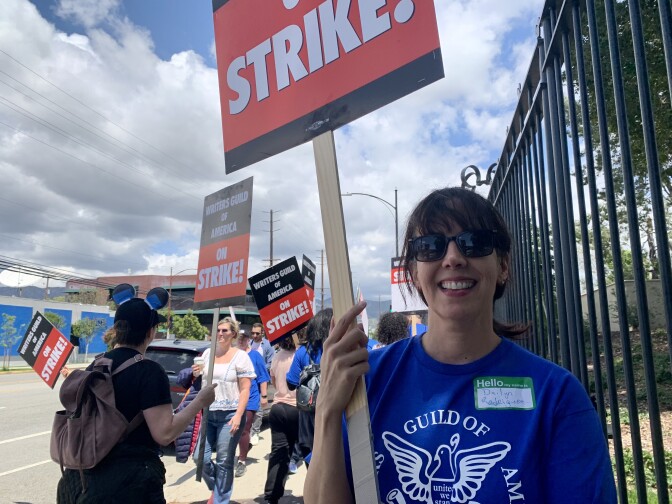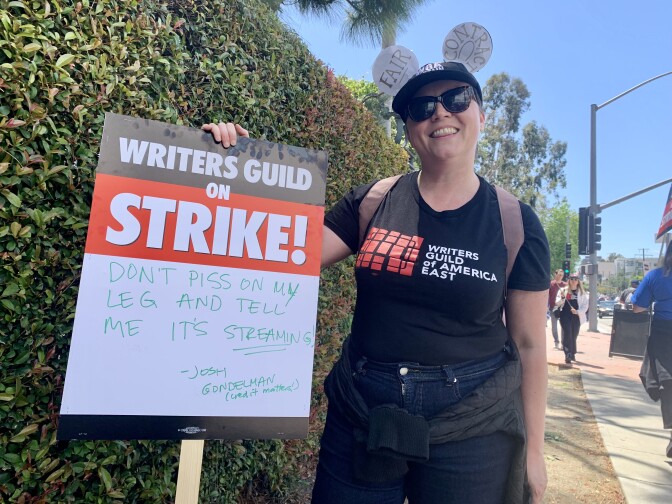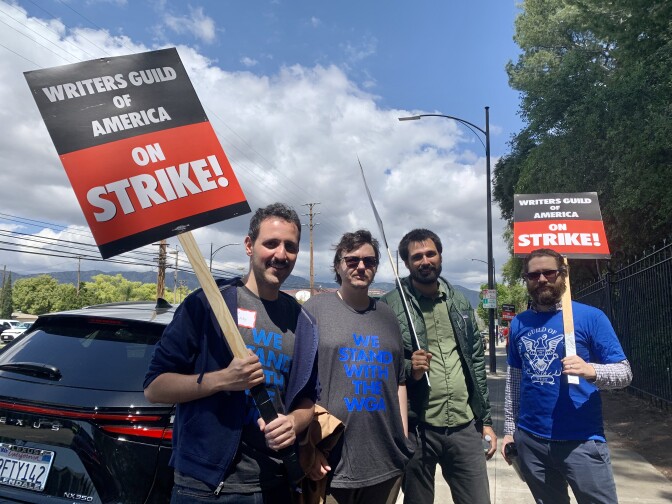This story is free to read because readers choose to support LAist. If you find value in independent local reporting, make a donation to power our newsroom today.
Writers And Allies Bring Energy And Frustration To The WGA Picket Line

As the Writers Guild strike got underway, picketers outside movie studios in Burbank expressed frustration, anger, sadness and nostalgia for better times.
Dailyn Rodriguez, a member of the WGA West board, said wages have gone down in recent years as streaming has boomed and the way television is made has changed.
"Currently, 50% of our union is working at minimum scale," she said. "The majority of our union lives in Los Angeles or New York and cannot afford to live in these cities because of this wage reduction."

Meanwhile, she said, those at the top of the industry are pulling in enormous sums of money.
"We are working less weeks for less money at scale, while they're making billions of dollars," she said.

Kaitlin Fontana, a screenwriter who focuses on queer storytelling, agrees.
"The big bosses in the consolidating media companies are having to make bigger and bigger profits because they are in service to Wall Street now," she said.
"We have to keep earning more and more and more money, and instead of that falling on the executives who make billions and billions of dollars a year, it falls on us as writers, it falls on the below the line workers, it falls on everybody else who works in this industry to have to prop up the Wall Street dollars."

Cinematographer Ryan Thomas also came out to support the strikers.
"I see the issues that they're bringing up and I think that it's something that affects all of us, not just writers, you know, doing shorter runs of episodes and things like that and how that affects your pay. I think that that's felt by all the crafts across the board," he said.
He wanted to back the strike, even though he knows it could significantly impact his own work and that of his colleagues.
"I think that it could affect our livelihood," he said. "But at the same time, I don't care that much. I would much rather that they go on strike than for me to be comfortable."

Movie director and writer Judd Apatow, a member of WGA, spoke recently to our newsroom's John Horn about his fear that writers will leave the profession.
“The shortsightedness of most of these corporations is in the fact that they don’t realize that they will eliminate their workforce," he said.
"People won’t go into writing anymore if you can’t afford to live. You’re going to lose brilliant people because they’ll just say, 'I’ll just go create video games,' or just do something else.”
Meanwhile other industry workers say the uncertainty of months of talks before the strike led to a production slowdown which has already affected them. Kendra Dawkins is an art director who worked on Black Panther: Wakanda Forever.
"I have a friend who has decided to work in a different industry altogether," she said. "I have another friend who is struggling with health insurance and navigating that world, and myself, I'm still looking at six months out of work at this point. It's longer than I was out during the pandemic."
Set electrician Mario Colli-Moon said if the strike means production slows down even further, he's been talking to his wife about a backup plan. If he's out of work for six months or so, they may move out of state.
"I have strong roots in Florida right now, and there are some good economic opportunities there adjacent to what I do," he said. "I would not be in the film industry if I had to move back to Florida, but you know, that would be the next thing."







